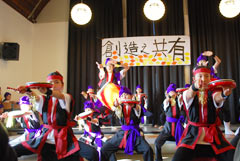Japanese International School teacher Tobaru creates eisa sensation in Berlin

Last November, students performed eisa dance in the school festival of the Japanese International School in Berlin.
February 20, 2012 Kumiko Hokama, Ryukyu Shimpo
Kiyofumi Tobaru, a teacher dispatched from Okinawa to the Japanese International School in Berlin, will finish his three-year tenure this March but may leave behind the eisa dance sensation in Berlin. The eisa dance performed by his students in the school festival held last November 12 received a great response, and will be performed again at the final event of the International Tourism Bourse Berlin, which starts from March 7.
For the school festival Toyama procured 19 small paranku drums used for eisa, two big odaiko drums, and sticks, and the students’ mothers made costumes using cloth ordered from Okinawa. The students performed the full-scale eisa wearing the costumes.
They danced to two songs, Nenju-Kuduchi by the Rinken Band and Miruku-Munari by Hidekatsu. For students who did not know anything about eisa or Uchinaguchi, Tobaru explained the meaning of the lyrics and lent them videos in which he demonstrated eisa.
Despite the numerous difficulties involved, many students even devoted their free time to practicing the dance, and as a result, they were able to perform it very well on stage and impress the audience. After that, they were invited to perform at a neighboring elementary school and a sister school.
“The students are keen on eisa. Maybe the idea of hitting a drum as they dance attracted the children. Also parents praised them very much. It seems that people were moved by the powerful sound of the paranku and odaiko drums, which is a little different from Japanese traditional arts and is rather exotic.” Tobaru said.
Coincidentally, the date of the final event of the International Tourism Bourse Berlin is March 11. Tomoko Tobaru, Kiyofumi’s wife, who has helped to make the costumes, said, “I hope it will help convey our feelings of gratitude for the assistance offered by people all over the world for victims of the Great East Japan Earthquake and display some of the charm of Japan. I am Okinawan, so I am very proud that we can perform eisa in Germany.”
(English translation by T&CT, Lima Tokumori and Mark Ealey)
Previous Article:First passengers of an around-the-islands-cruise depart from Naha Port
Next Article:Possibility of holding an international tournament in Okinawa discussed at the East Asia Basketball Executive Meeting
[Similar Articles]
- Climax of the Okinawa Zento Eisa Festival
- Okinawa Zento Eisa Festival attendance reaches record high at 34,000 people
- Eisa Hall opens in Okinawa city for visitors to practice
- Climax of Okinawa Zento Eisa Festival
- 10,000 Eisa Dance Parade in Naha
 Webcam(Kokusai Street)
Webcam(Kokusai Street)


